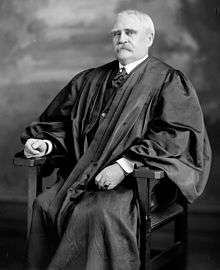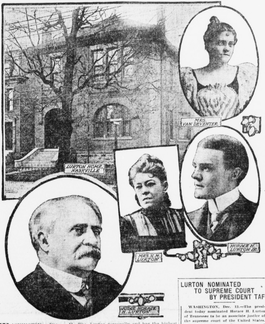Horace Harmon Lurton
| Horace Harmon Lurton | |
|---|---|
 | |
| Associate Justice of the Supreme Court of the United States | |
|
In office December 20, 1909 – July 12, 1914[1] | |
| Nominated by | William Taft |
| Preceded by | Rufus Peckham |
| Succeeded by | James McReynolds |
| Judge of the United States Court of Appeals for the Sixth Circuit | |
|
In office March 27, 1893 – December 20, 1909 | |
| Nominated by | Grover Cleveland |
| Preceded by | Howell Jackson |
| Succeeded by | Loyal Knappen |
| Personal details | |
| Born |
February 26, 1844 Newport, Kentucky, U.S. |
| Died |
July 12, 1914 (aged 70) Atlantic City, New Jersey, U.S. |
| Political party | Democratic |
| Education |
Douglas University (BA) Cumberland University (LLB) |
| Military service | |
| Allegiance |
|
| Service/branch |
|
| Years of service | 1861–1864 |
| Rank | First Lieutenant |
| Unit |
|
| Battles/wars | American Civil War |
Horace Harmon Lurton (February 26, 1844 – July 12, 1914) was an American jurist who served for four years as a Justice of the Supreme Court of the United States. Appointed at the age of 65, Lurton was the oldest justice to be appointed to the Court for the first time.[lower-alpha 1]

Life
Lurton was born in Newport, Kentucky, the son of a physician turned clergyman. He was a Sergeant Major in the Confederate Army during the Civil War, serving in the 5th Tennessee Infantry, 2nd Kentucky Infantry, and 3rd Kentucky Cavalry. He was twice captured by Union forces, the second time sent as a prisoner of war to Johnson's Island Prison Camp in Sandusky Bay, Ohio. He claimed he was later paroled by President Lincoln because of pleas for mercy from his mother but this was merely an anecdote he often repeated to dinner guests, according to historian Roger Long. Mr. Long explains in detail what the evidence shows in an article he wrote in the December 1994 edition of Civil War Times. According to Mr. Long, apparently he was paroled from Johnson's Island only when he signed the oath of allegiance, not because of any act of the president. Mr Long's article includes interesting details about Lurton's service as well as possible reasons for the anecdote he was so fond of repeating.
Lurton was a family friend of noted historian and jurist Samuel Cole Williams.
Education and early practice
Before the war, Lurton attended Douglas University and earned an LL.B. in 1867 at Cumberland School of Law, then part of Cumberland University but now part of Samford University. At Cumberland he was a member of Beta Theta Pi. Lurton then practiced law in Clarksville, Tennessee.
Career as a judge
In 1875, Lurton left private practice after being chosen as a judge of the Tennessee Chancery Court for the Sixth Chancery Division. After three years, Lurton then returned to his practice until 1886, when he was appointed to the Tennessee Supreme Court.
In 1893, Lurton was appointed by President Grover Cleveland to a federal appellate judgeship on the US Court of Appeals for the Sixth Circuit. While still on that court, Lurton first taught at and later served as dean of the Vanderbilt University School of Law from 1905 to 1909.
Supreme Court service
In 1909, Lurton's friend, President William Howard Taft, named him to a seat on the Supreme Court that had been vacated by the death of Justice Rufus Wheeler Peckham. It was the first of Taft's five Supreme Court appointments, six if one counts the elevation of Edward White to Chief Justice, and surprised some observers because unlike Taft, Lurton was a Democrat. Taft's attorney general George W. Wickersham said that at 66, Lurton was too old to become a Supreme Court justice, but Taft had always admired him. According to the Complete Book of U.S. Presidents (2001 edition), Taft later said that "the chief pleasure of my administration" was the appointment of Lurton.
Lurton sided most frequently on the court with Oliver Wendell Holmes, Jr.,[3] a progressive Supreme Court justice. The most notable opinion he authored was probably the opinion of the Court in Coyle v. Smith, 221 U.S. 559 (1911), which held that the federal government could not tell a state where to locate its capital, as that all states must be on "equal footing."
Lurton took his seat on the Court at the beginning of 1910. His tenure on the Court was brief, as he served only four years before dying in Atlantic City, New Jersey of a sudden heart attack, in 1914. According to his obituary in The New York Times (July 13, 1914, p. 1), he had been in poor health since the previous December, suffering from asthma and then pneumonia.
Legacy and honors
During World War II the Liberty ship SS Horace H. Lurton was built in Brunswick, Georgia, and named in his honor.[4]
Notes
- ↑ Charles Evans Hughes was two years older when appointed as Chief Justice by Herbert Hoover, but had served five years on the Court between the ages of forty-eight and fifty-three
References
- ↑ "Federal Judicial Center: Horace Harmon Lurton". 2009-12-12. Archived from the original on 2009-05-13. Retrieved 2009-12-12.
- ↑ "Compiled service records of Confederate Soldiers who served in organizations from the State of Kentucky". National Archives. Retrieved 25 February 2018.
- ↑ http://tennesseeencyclopedia.net/entry.php?rec=814
- ↑ Williams, Greg H. (25 July 2014). The Liberty Ships of World War II: A Record of the 2,710 Vessels and Their Builders, Operators and Namesakes, with a History of the Jeremiah O’Brien. McFarland. ISBN 1476617546. Retrieved 9 December 2017.
External links
- Horace Harmon Lurton at the Biographical Directory of Federal Judges, a public domain publication of the Federal Judicial Center.
- Irons, Peter. A People's History of the Supreme Court, p. 260. Penguin Books, 2000. Peter Irons wrote critically of Lurton's lack of impact on American Constitutional Law, even though Lurton only served on the High Court for four years before his death.
| Wikimedia Commons has media related to Horace Harmon Lurton. |
| Legal offices | ||
|---|---|---|
| Preceded by Howell Jackson |
Judge of the United States Court of Appeals for the Sixth Circuit 1893–1909 |
Succeeded by Loyal Knappen |
| Preceded by Rufus Peckham |
Associate Justice of the Supreme Court of the United States 1909–1914 |
Succeeded by James McReynolds |
|
 | ||||||||||||||||||